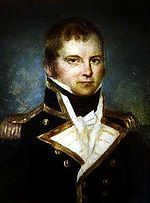Robert Barrie, Date of Birth, Place of Birth, Date of Death
TweetRobert Barrie
British naval officer
 Date of Birth: 05-May-1774
Date of Birth: 05-May-1774
 Place of Birth: St. Augustine, Florida, United States
Place of Birth: St. Augustine, Florida, United States
Date of Death: 07-Jun-1841
Profession: explorer
Nationality: United States
Zodiac Sign: Taurus 
About Robert Barrie
- Sir Robert Barrie KCB, KCH (5 May 1774 – 7 June 1841) was a British officer of the Royal Navy noted for his service in the War of 1812. He was helped early in his naval career by the patronage of his uncle, Sir Alan Gardner, who arranged for him to take part in the Vancouver Expedition.
- When the Pacific Coast was explored, he had served as a midshipman with Captain Vancouver in 1791.
- He served in European waters from 1801 to 1811.
- He was mentioned in dispatches for his gallant conduct in a fight with a French squadron when, as First Lieutenant of Bourdelais, "though dangerously wounded, he had disdained to quit the deck".
- Barrie then commanded a number of ships during the French Revolutionary and Napoleonic Wars.
- In 1804 he had been promoted Captain commanded Brilliant at 24-guns and in 1806 he went to Pomone at 38-guns.
- On 5 June 1807, he attacked a convoy of seventeen ships, sank three men-of-war, and captured fourteen other warships and store ships.
- He captured a privateer commanded by De Boissi, the Adjutant-General of France.
- In 1809, he captured a French warship and five transports.
- In 1811 he captured a Corsican fort and three French men-of-war.
- In 1811, he captured several important French prisoners, including Napoleon's brother Lucien Bonaparte on a French ship.
- He was particularly active during the War of 1812, carrying out several successful attacks on American towns and shipping in the Penobscot River region, and helping to destroy the Chesapeake Bay Flotilla.
- From 1813 to 1815 he served in the Dragon in American waters, and here again he made many captures.
- In 1813 Barrie collected runaway slaves from the Maryland and Virginia shores.
- After a brief period spent living in France Barrie took up the post of Acting Commissioner of the Quebec Dockyard 1817-1818.By 1819, he served as Commissioner of the dockyard at Kingston.
- He was active in a number of areas, building and expanding the dockyard and promoting important hydrographic surveys and the construction of canals.
- Between 1819 and 1820 Captain Barrie, as Flag Officer of the Great Lakes, built the Stone Frigate in Kingston Royal Navy Dockyard to house the gear of the warships of 1812 laid up in Navy Bay.
- His instructions were to expedite the repair of the vessels at the bases in case of any emergency.
- From December 1820, the command of Flag Officer of the Great Lakes disappeared from the Navy List.
- In March 1824 Barrie was listed as "Acting Resident Commissioner, Kingston, Upper Canada" and his headquarters was shown to have been transferred to Kingston.He cultivated friendships with several important political figures, and on his return to England in 1834 received a number of honours.
Read more at Wikipedia

